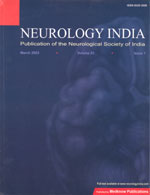
|
Neurology India
Medknow Publications on behalf of the Neurological Society of India
ISSN: 0028-3886 EISSN: 1998-4022
Vol. 53, Num. 1, 2005, pp. 65-65
|
Neurology India, Vol. 53, No. 1, January-March, 2005, pp. 65
Invited Comments
Invited Comments
Chaturvedi SantoshK
National Institute of Mental Health and Neurosciences, Bangalore
Correspondence Address:National Institute of Mental Health and Neurosciences,
Bangalore Email: skchatur@rediffmail.com
Related article: The PHC-cog: A brief cognitive function
screening test for the elderly
Code Number: ni05017
There are not too many options for the assessment of cognitive functions in the elderly or in whom you suspect dementias. The options are further limited if you have busy clinics, too many patients and a lack of time and personnel. The PHC-Cog attempts to be user-friendly and of assistance to clinicians to do rapid assessments to screen cases of cognitive dysfunction. They could do it themselves or train any lay person or another staff member to do it. This study has attempted to develop this brief screening test for the detection of cognitive dysfunction, which can be quickly administered by laymen in places with limited medical manpower, and which does not require professional skills to interpret its results.
The PHC-Cog relies heavily on time disorientation items as a screening instrument. These items were found to have the best discriminating ability for diagnostic prediction of dementia. It is known that time sense orientation gets affected quite early, and hence the use of such items may pick up early cases. The psychometric properties have been found to be sound. The ′Informant′s section′ is a little more detailed, but still contains statements which are usually reported by the relatives of the dementia patients. The PHC-Cog does not have items related to recent memory disturbances.
The screening instrument can only be used if the elderly subjects visit the health center for a flu vaccination! The authors need to suggest some flexible item which can substitute this, otherwise it will restrict its usage. Some illiterate Indian patients may find it difficult to understand the interlocking of the pentagons. The ′Informant′s section′ also has some items which may be potentially problematic - like the one about keeping appointments, change of personality, or selection of clothes.
This One-minute screening instrument is promising for detection at the primary care level or for community surveys. It has been tried out in Korea. Other developing countries and busy centers need to try it out to actually determine the scale′s usefulness. The scale would need some adaptation for Indian settings and for different health centers. For example, if the person has come for a check-up of his blood pressure or blood sugar, or some other aspect, that could become the first question, replacing flu vaccination. It also has potential for usage to detect cognitive dysfunction due to causes other than dementia. The screening instrument does not show any indication of being used as a prognostic tool though, and the authors have made no such claims.
Copyright 2005 - Neurology India
|
